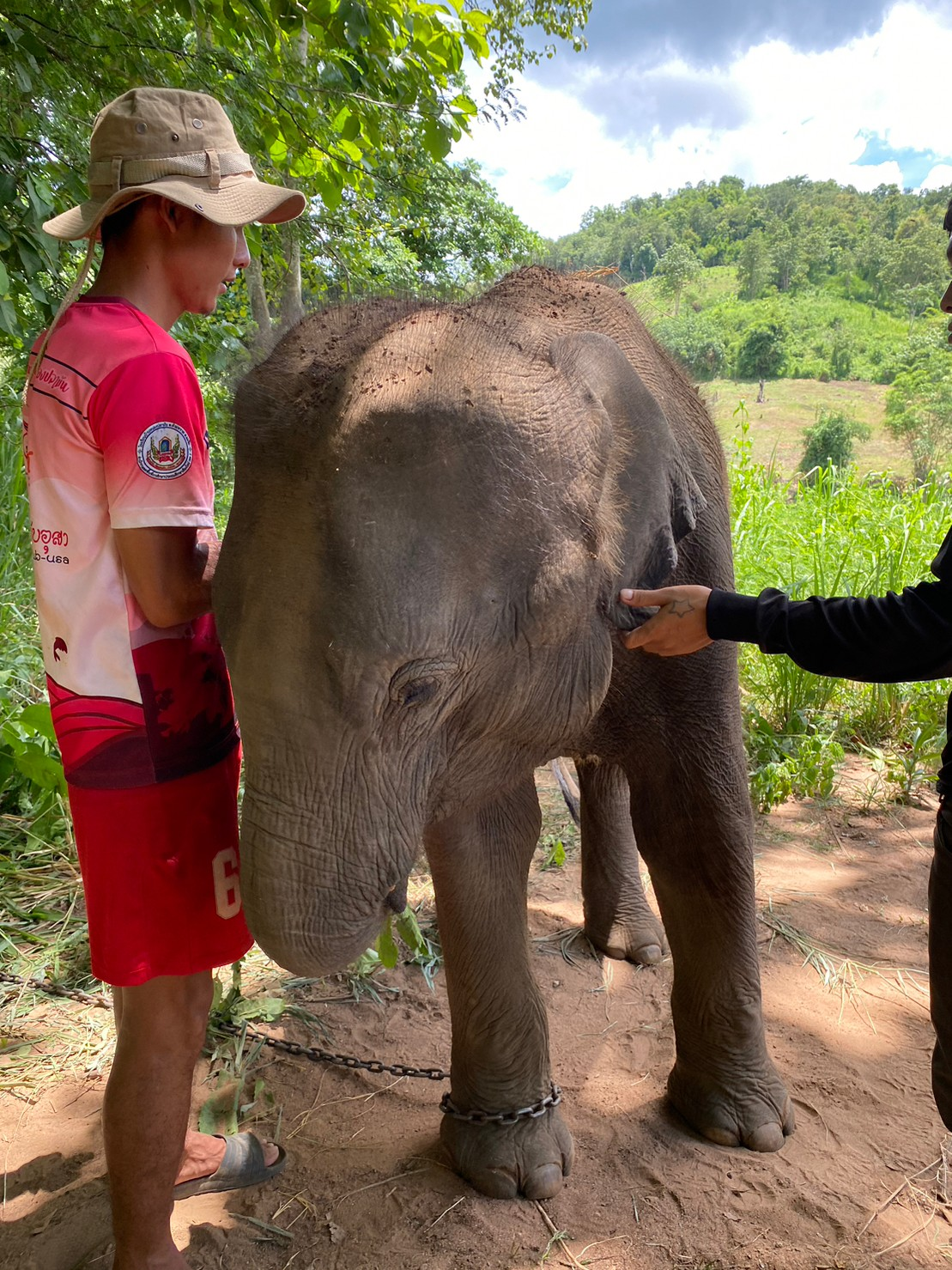Beginning in 2020, Asian Elephant Support committed funds to support the ongoing work of the Chiang Mai University Mobile Vet Clinic. This unit travels throughout northern Thailand to provide both preventative and emergency care for elephants in need. The staff from the unit regularly participates in educational opportunities to exchange knowledge with colleagues working to care for Asian elephants. We hope you continue to enjoy the updates we receive from our partners from the Mobile Vet Clinic and their work to uphold our mission to care for and conserve elephants in Thailand and across Asia.
The Chiang Mai University’s Mobile Vet Clinic, including Dr. Eye and other veterinary staff were on the move as usual during the month of July.
The veterinary staff from various organizations conducting the health checks for the elephants of Chiang Mai
The crew worked with the Chiang Rai Provincial Livestock Office and the Thai Elephant Alliance to perform health checks on 42 elephants in five camps in the Chiang Rai province. Of the 42 elephants, all were reported to have excellent body condition, due to a seasonal abundance of food. The team did take additional time to treat several elephants, including a bull with a damaged tusk and infection. In this region, there are veterinarians from the Department of Livestock Development that will be able to provide follow-up care as prescribed.
Veterinarians & mahouts work together to treat an elephant with a tusk infection
This trip was followed by more health checks on a group of 11 elephants living in the Hauy Pak Kood village of the Mae Jam district.
All of the elephants were found to be in excellent health and the veterinary team only needed to provide preventative treatments for deworming and supplemental vitamins. While there, the team was excited to find a very cute surprise - a one-month old elephant calf!
One-month old elephant at Hauy Pak Kood Village
During the first week in July, the CMU Mobile Clinic team followed up with a few elephants in the Mae Wang area that they treated back in June. The two elephants who were treated, one for an abscess on the trunk and the other for a wound on the belly, were both completely healed. After the follow up exam, the crew went to check on an elephant in the Mae Tang area that was suffering from lameness in her left front leg for one to two months. A thermal camera was used to look for areas of inflammation, which was found around the metacarpal (wrist) joint. The veterinarians performed laser therapy to the area and herbal massage, which is an effective traditional treatment.
Laser therapy being performed to help reduce inflammation & lameness for this elephant in Mae Tang
Later in the month, the veterinary team traveled to treat an elephant in Mae Wang displaying symptoms of abdominal pain. For four days, the owner said that the elephant’s feces had been smaller than usual, and the elephant was open mouth breathing and consistently standing up and sitting down. Upon examination, the doctor heard stomach sounds consistent with gastrointestinal issues, and the elephant was dehydrated.
Fluids were given as well as a pain reliever, vitamins and an enema. After an enema and examining the feces, the team suggested the elephant go directly to the hospital due to the hard dry fecal matter that was produced. They were concerned that the elephant couldn’t chew its fodder well and were afraid the hard feces was blocking the intestinal tract, which can be life-threatening and require continuous care and treatment. This is the fourth time she has experienced these issues. The prognosis for this elephant is guarded, but with the expert support of this veterinary team, we know they will do all they can to care for her.
An enema is performed at the elephant hospital to remove impacted feces in an effort to relieve pain & potentially save this elephant's life
The CMU Mobile Vet Clinic wrapped up July by visiting a four-year old elephant calf in Mae Wang district who was suffering from diarrhea and not eating hay. The team was initially concerned these symptoms were indicative of Elephant Endotheliotropic Herpesvirus (EEHV) a deadly disease that impacts one in five young Asian elephants and can take their life within 48 hours of the onset of symptoms. Thankfully upon examination, the calf was not lethargic, nor did she have a fever or any hemorrhagic signs of EEHV. There were internal parasites seen in the feces, and the calf was interested in eating bamboo and drinking water. The veterinary team administered pain relievers and Vitamins B and C to stimulate her immune response. The following day, the calf’s mahout reported the elephant was feeling better!
As the year rolls on, so does the crew of the Chiang Mai University Mobile Vet Clinic, tirelessly providing life saving care to northern Thailand’s elephants. To show your support for this team, please donate so they can continue their invaluable work at www.asianelephantsupport.org/donate or via Venmo @asianelephantsupport. Thank you.










